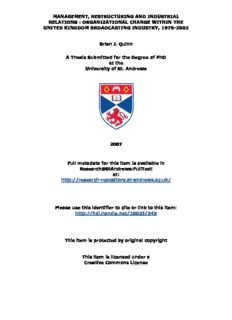
Brian J Quinn PhD Thesis PDF
Preview Brian J Quinn PhD Thesis
;.<.42;2<B! @2AB@C0BC@6<4 .<1 6<[email protected] @29.B6=<A , =@4.<6F.B6=<.9 05.<42 D6B56< B52 C<6B21 86<41=; /@=.10.AB6<4 6<1CAB@E! &+*+"’%%’ /VOGS 7# ?YOSS . BNKWOW AYHROXXKJ LTV XNK 1KMVKK TL >N1 GX XNK CSOZKVWOX] TL AX# .SJVK[W ’%%* 3YQQ RKXGJGXG LTV XNOW OXKR OW GZGOQGHQK OS @KWKGVIN-AX.SJVK[W,3YQQBK\X GX, NXXU,$$VKWKGVIN"VKUTWOXTV]#WX"GSJVK[W#GI#YP$ >QKGWK YWK XNOW OJKSXOLOKV XT IOXK TV QOSP XT XNOW OXKR, NXXU,$$NJQ#NGSJQK#SKX$&%%’($()+ BNOW OXKR OW UVTXKIXKJ H] TVOMOSGQ ITU]VOMNX BNOW OXKR OW QOIKSWKJ YSJKV G 0VKGXOZK 0TRRTSW 9OIKSWK Management, Restructuring and Industrial Relations: Organizational Change within the United Kingdom Broadcasting Industry 1979 – 2002. A thesis submitted for the degree of PhD. By Brian J. Quinn BA (Hons). School of Management, The Gateway, North Haugh, St Andrews. University of St Andrews, Scotland. I, Brian Quinn,herebycertifythat this thesis, whichis approximately25,000words inlength, has beenwrittenbyme,that it is therecordof workcarriedout bymeandthat it has not been submittedinanyprevious applicationforahigher degree. Date……….. Signatureofcandidate……………………. Iwas admittedas a researchstudent inOctober1998andas acandidate for thedegreeof PhDinOctober1999; thehigherstudyforwhich this is arecordwas carriedout inthe UniversityofSt Andrews between1999 and2005. Date……….. Signatureofcandidate……………………. Iherebycertifythat thecandidatehas fulfilledthe conditions oftheResolutionand Regulations appropriateforthedegreeofPhDintheUniversityofSt Andrews andthat the candidateis qualifiedtosubmit this thesisinapplicationforthat degree. Date……….. Signatureofsupervisor……………………. Unrestricted. Insubmittingthis thesis totheUniversityofSt Andrews Iunderstandthat Iam giving permissionforit tobemadeavailableforuseinaccordancewiththe regulations ofthe UniversityLibraryforthetimebeinginforce,subject toanycopyright vestedintheworknot beingaffectedthereby. Ialso understandthat thetitleandabstract will bepublished,andthat acopyofthe workmaybemadeandsuppliedtoanybona fidelibraryorresearch worker, that mythesis will beelectronicallyaccessiblefor personal orresearchuse, andthat the libraryhas theright tomigratemythesis intonew electronic forms as requiredtoensure continuedaccess tothethesis. Ihaveobtained anythird-partycopyright permissions that may berequiredinorderto allowsuchaccess andmigration. Date……….. Signatureofcandidate……………………. ii ABSTRACT. Inthepast decaderesearchers begantoremedya literaturedeficit inthestudyof broadcastinginstitutions –addressinginparticular theissues oflabourprocess,restructuring andindustrial relations. This thesis whichconsiders management change, industrial relations andrestructuringwithintheUnitedKingdom (‘UK’)broadcastingindustryemploys a case studyformat withaview tohighlightingthevariations ofindustry(macro) andfirm (micro) basedrestructuring.Organizational change was not auniform process throughout theUK broadcastingindustryandsignificantlydifferent strategies weredeveloped bymanagement withinthetwomainterrestrial broadcasters –inparticularinattemptingtofundamentally altertheorganizationofprogrammeproduction.Thelabourprocess and experienceof employees andowner-managers withintheindependent productionsector was also distinguishableas betweenthetwomainUKterrestrial broadcasters. Inordertoprovideatheoretical underpinningtotheempirical studies which form the centrepieceofthis thesis, thefourthemes of contemporarylabourprocess theoryare explored.Thesecontributions areincludedbecauseexaminations undertakenoflabour processes haveresultedincritical insights as tothenatureofmanagement andlabour relationships. Togetherwithfirm basedorganizational restructuringofthe broadcasting industry,thepast 25 years haveseenverysignificant regulatorychange consequent ona varietyoflegislativeinitiatives andwhichareset out. Thecasestudies beginwiththewide-scale restructuringofindustrial relations withinthe Independent Television(‘ITV’)sectorsince1979 (Chapter4).Thesecond casestudy (Chapter5)is concerned withtheimplementationofaset ofmanagerial strategies aimedat reshapingthelabourprocesses withintheCentral Scotland ITVfranchise– Scottish Television Ltd.(‘STV’). Chapter6deals withthe implementationofnew workingpractices andwhat might bedescribedas anattackonemployeeidentitywithinBBC Scotland.The restructuringoftheCorporationalongquasi-commercial lines withspecificreferencetothe employment ofthedirectorate(distinct business units)system is examined.Thefinal case study(Chapter7)is anexaminationoftheindependent productionsectortracingthe emergenceof a groupof ProducerOwners (independent productioncompanyowners)who emergedduringthefirst halfofthe1990s and whohavesincebecome asignificant forcein British televisionproduction.This studyalso traces thedevelopment ofthe career and networkinglabourofthe groupofindividuals employedonshort-term contracts bythe independent productioncompanyowners. ii Contents. Chapter Page Introduction. i-vii. Chapter 1: Core Theoretical Underpinnings: 1-51. Introduction to Labour Process Theory and the United Kingdom Broadcasting Industry. Chapter 2. The Materials and Methods of Study. 52-65 Chapter 3: The Political and Regulatory Context of the UK 66-89. Broadcasting Industry 1979-2002. Chapter 4: Management, Work and Industrial Relations: 90-122. British Commercial Television, 1979-2000. Chapter 5: Management –Technology and Industrial 123-157. Relations Change: Re-Regulating the Employment Relationship. A Case Study of Scottish Television PLC. 1979- 2001. Chapter 6: Marketizing – a Cultural Bureaucracy: 158-195. Negotiating Organizational Change in BBC Scotland 1982-2002. Chapter 7: Networking and The Independent Television 196-231. Production Sector in the United Kingdom 1982-2000. Chapter 8: Summary and Conclusions. 232-247. References: 1-LV. iii . Chapter 1:Core Theoretical Underpinnings Introduction to Labour Process Theory and the UK Broadcasting Industry Introduction. 1. 1.1. Situating Labour Process Theory (LPT). 4. 1.2. Regulation of the Broadcasting Industry and Management of Work and Industrial Relations Change. 10. 1.2.1. Regulation and Fordism. 11. 1.2.2. Post-Fordism and De-Regulation of Work. 16. 1.3. De-Skilling and Up-Skilling; the changing nature of work within broadcasting. 22. 1.3.1. The De-Skilling Thesis. 24. 1.3.2. The Up-Skilling Thesis. 27. iv 1.4. Identity and Work for Creative Workers. 30. 1.5. Networks and Networking within the Independent Television Production Sector. 39. 1.5.1. Networking and Producer Owners. 42. 1.5.2. Broadcast Professionals and Networking. 44. Conclusion. 49. Chapter 2: The Materials and Methods of Study. Broad Research Questions of the Study. 52. 2.2 Rationale for the Multiple Case Study Research Approach. 53. 2.3 Data Selection Methods and Selection of Cases. 56. 2.4 Data Gathering Methods and Interviews Undertaken. 57. v 2.5 Statement of Interviews, Including Date and Location. 62. Chapter 3: The Political and Regulatory Context of the UK Broadcasting Industry. Introduction. 66. 3.1. Context For Industry Change. 67. 3.2. UK Television Broadcasting 1950-1979. 70. The Pilkington Report. 71. The Annan Report. 72. 3.3. Pre-Peacock De-regulatory Manoeuvrings. 73. 3.4. The Move to Marketization: The Peacock Report. 73. 3.5. Broadcasting in the 1990s and Beyond. 79. vi 3.6. The Broadcasting Act, 1990. 80. The Broadcasting Act, 1996. 84. The Communications Act, 2003. 86. Conclusion. 87. Chapter 4: Management, Work and Industrial Relations: British Commercial Television, 1979-2000. Introduction. 90. 4.1. ‘Tales of Corruption’. 92. 4.2. National Agreements and Regulation; A Relatively Quiet Industrial Relations Environment. 95. 4.3. The Formation of Employers’ Strategy. 101. 4.4. The Collapse of the Guild Strategy. 115. 4.5. Industrial Relations in the 1990s. 118. Conclusion 121. vii Chapter 5: Management –Technology and Industrial Relations Change: Re-Regulating the Employment Relationship. A Case Study of Scottish Television PLC. 1979- 2001. Introduction. 123. 5.1. Management and Labour in a Regulated Environment. 126. 5.2. The New Broadcasting Economy? The Move From A Regulated to A Flexible Workplace. 133. 5.3. Work and Employment Relations in The Late 1990s and Beyond. 148. 5.4. Game Show 1. 149. 5.5. SMG Opinion Survey. 153. Work Organization and Quality. 154. Management Effectiveness. 154. Leadership and Direction. 155. Communications. 155. Conclusion. 156. viii
Description: